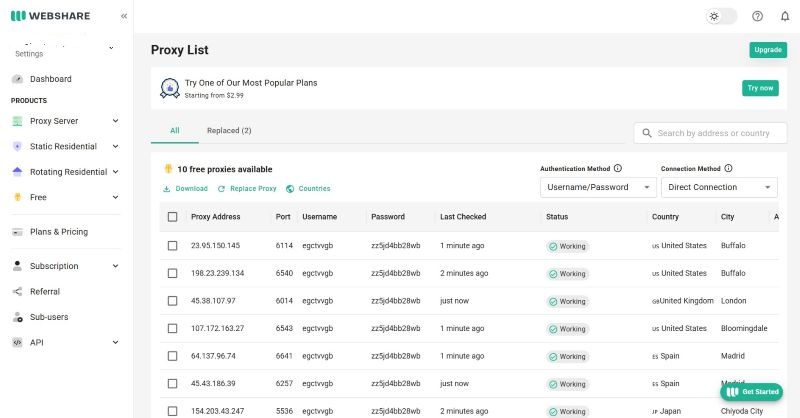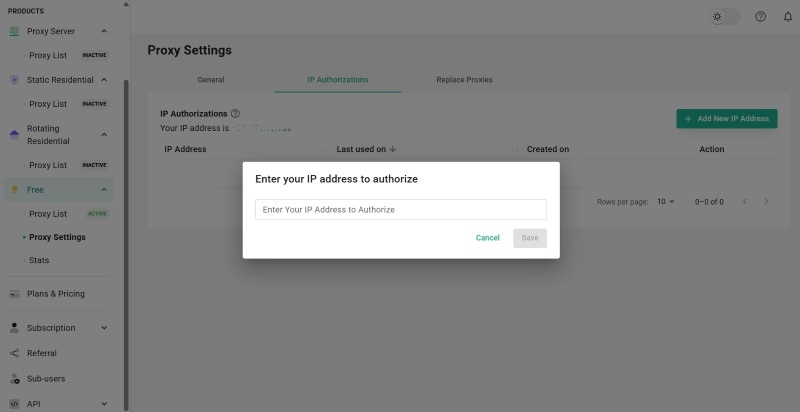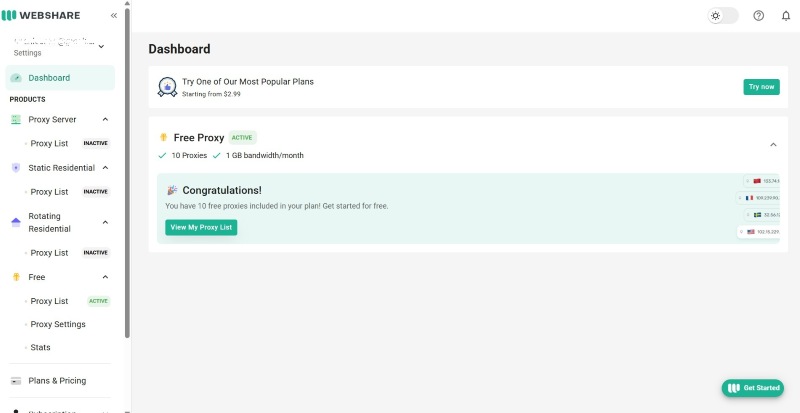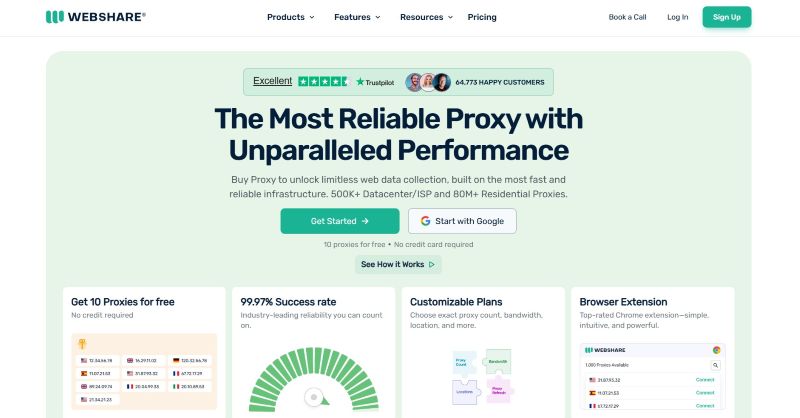Why you may belief TechRadar
We spend hours testing each services or products we assessment, so that you will be positive you are shopping for the very best. Find out more about how we test.
Webshare got here into existence in 2018 to satisfy the fast-growing want for proxies. To realize this, it gives proxy servers for particular person customers and organizations, fulfilling over 650 billion proxy requests per thirty days. Its service consists of entry to 80 million+ static residential proxies, rotating residential proxies, and proxy servers in each nation on the planet (sure, that’s 195).
In 2024, Webshare formally got here below the auspices of Oxylabs, one other notable proxy server supplier. Nonetheless, this doesn’t appear to have introduced any main modifications, because it has continued to function independently because it did earlier than. It additionally hasn’t obtained a few of Oxylabs’ superior options, like internet scraping APIs.
Webshare: Plans and Pricing
Webshare charges its service by the type (proxy server, static residential, and rotating residential), number of IPs purchased (for proxy server and static residential), amount of traffic per month (for rotating residential), as well as the duration of the subscription (monthly or yearly).
Proxy server pricing starts at free for up to 10 proxies, which can be used as a free trial, just go get a taste of the service before committing to one of its paid plans with more IPs – but only this particular tier of the service.
The monthly-based proxy server plan with 100 proxies is charged $2.99 each month (that’s $0.0299 per proxy), and the more IPs you choose, the higher the discount, so 60,000 proxies come at a price tag of $0.0179 per IP. Going with the yearly option entails more discounts, so 100 proxies are charged $1.99 per month ($0.0239 per proxy), or $0.0144/proxy if you take 60,000 of them.
Moving onto the static residential proxies ranges from $4 per month for 20 proxies under the yearly plan to $20.01/month for 100 proxies, to $95.05/month for 500 proxies, to $180.09/month for 1,000 IPs, to $1,500.75/month for 10,000 IPs ($0.18 per proxy). There are other options based on the specific number of proxies required. The month-by-month plans are somewhat more expensive.
Finally, rotating residential proxies are cheaper than their static counterparts and are charged per GB. So, a 1 GB plan under the yearly commitment will cost you $2.8/GB/month, 10 GB goes for $2.20/GB or $20.20 per month, 25 GB can be yours at $2.08/GB or $52/month, 100 GB is charged $1.80/GB or $180/month, and 3,000 GB is priced at $1.12/GB or $3,360/month.
That said, Webshare doesn’t offer a free trial for its residential IPs. There’s no money-back guarantee either, but the company does provide a possibility of a refund under certain conditions. These include not having breached 1 GB of bandwidth, having fewer than 1,000 proxies used in the subscription, and making the request not later than 48 hours after the purchase.
Webshare: Features
A user’s adventure with Webshare starts at registration, which can be done via your email address or through an existing Google account. Considering that the platform already caters to more than 60,000 businesses, you know you’re going to be in good hands here. Once the registration is out of the way, you’ll be redirected to a dashboard with access to all of Webshare’s features.
Residential IPs
Webshare’s rotating residential IP addresses are ethically sourced, which means they come from consenting users, something that means a lot in a proxy industry overwhelmed by illegally obtained IP addresses. In other words, Webshare gets its IP addresses from device owners agreeing to join its proxy network in exchange for certain benefits.
Residential IPs are useful in many cases. For example, a hotel comparison site needs to scrape price lists from many hotel websites. However, hotel websites often discourage scraping by placing geo-restrictions and IP restrictions. Suppose a U.S.-based hotel blocks foreign IPs from accessing its website. Webshare lets you bypass it by choosing a proxy U.S. IP address to view the website and scrape pricing information.
Residential proxies are also helpful in e-commerce, wherein price comparison sites scrape data en masse to help people find the best deals. If you run a price comparison site, you can use residential IPs to access localized versions of a retailer’s website and scrape relevant information.
Webshare offers IP addresses in 195 countries around the globe (which means every country in the world as recognized by the United Nations), with the most popular locations including the United States, the United Kingdom, Germany, Japan, China, Australia, France, and Canada. It has over 80 million IP addresses spread across all of these countries.
Still, Oxylabs has 102 million+ IPs, and Decodo has 125 million, but Webshare is getting there, as it has grown the number of its own proxies from 30 million in 50 countries in December 2024 to the current figure that now includes all the recognized countries in the world.

Static Residential IPs
Static IPs are a faster alternative to Webshare’s residential IPs. They are technically still residential IPs, albeit sourced directly from internet service providers (ISPs). They’re faster and more reliable because the IP doesn’t change with each session, relying on the unstable Wi-Fi connections of the device owners. Static IPs are issued for long-term use and are harder to detect, helping you stay anonymous while browsing.
Webshare’s static IPs have unlimited bandwidth. That’s why it charges per IP instead of by bandwidth like the standard residential IPs. Webshare sources its static IPs from ISPs like AT&T, Sprint, and Cox Communications. These ISPs have massive networks and offer speeds of up to 1 GB per second. Once you pay for a static IP, it’s assigned only to you, and your IP address is fixed as long as your subscription remains valid.
Webshare has over 100,000 static IPs in its pool covering various countries. You can manage your proxies in an intuitive dashboard, utilizing them to bypass geo-restrictions and browse the web without revealing your actual IP address to third parties.
Proxy servers
Webshare offers its proxy servers with 400,000 IPs according to your specific needs. This means you can choose between shared proxy servers (shared with more than two users), private proxy servers (shared with one to two users), or dedicated servers (fully owned by you), with the pricing to match.
A dedicated proxy server offers much faster speed, as you aren’t sharing resources with other users. It’s similar to running your proxy network but with the features and flexibility that Webshare provides. With a dedicated proxy server, all your activities are only known to Webshare and are not shared with third parties.
You can connect to dedicated proxy servers using the HTTP and SOCKS5 protocols. Webshare’s dedicated servers offer up to 100 Gbps and unlimited bandwidth, which is ideal for massive data scraping. With nearly 100% uptime, which we verified during our test, you shouldn’t worry about reliability when using Webshare’s proxy servers.
Webshare’s dedicated proxy servers start from $26.60 monthly for 20 proxies with 250 GB bandwidth. If you surpass your bandwidth allocation, you can pay extra fees to get as much bandwidth as you need. You can also pay additional fees for unlimited IP authorizations, high concurrency, and a high-priority network (recommended when using proxy servers for time-sensitive data scraping).
Meanwhile, choosing a proxy server that you share with multiple users (more than two) is a budget option that provides the reliability of a standalone, but comes at a more affordable price. You can connect to shared servers with the HTTP and SOCKS5 protocols and choose IPs from over 50 countries.
You have unlimited bandwidth and speeds of up to 100 Gbps, the same as a dedicated server. However, your speed will vary depending on the workload of other users sharing the same server.
A shared proxy server costs $24 monthly for 25 proxies and 250 GB bandwidth, which can be upgraded to as much bandwidth as needed. You can also choose add-ons like unlimited IP authorization, high concurrency, and high-priority network.
The middle road is the private proxy option, where you only share your server with one to two other users, but nonetheless, you have access to all the perks offered by the above services – reliable uptime, HTTP/SOCKS5 support, IPs in 50+ countries, and a lower price.

Chrome Extension
Webshare offers a browser extension for Google Chrome that lets users rotate proxies at the click of a button. This extension is ideal for individual users whose primary use case for Webshare is bypassing geo-restrictions. Whenever you encounter a geo-restriction, just choose a proxy IP from the relevant country and refresh the website to view the previously restricted content.
Webshare gives 10 free proxies, which you can access from the browser extension instead of visiting the website whenever you need a new proxy.
Webshare: Ease of Use
Webshare offers an intuitive dashboard that makes all features easy to understand. From your dashboard, you can set up any proxy type that you’ve paid for. Whether it’s a static or rotating residential IP or a dedicated proxy server IP, you can spin one up at the click of a button. You’ll see the complete list of all available IPs, which you can change anytime.

The dashboard shows detailed analytics about your proxies, including the error ratio and bandwidth consumption. This analytics lets you monitor your real-time proxy usage and make any needed adjustments. You can switch between dark and light mode depending on what suits you.
Webshare: Customer Support
Webshare offers reasonable support to users, both directly and indirectly. The Help Center contains detailed user guides and manuals for all its features, teaching users how to deploy and manage proxies effectively. Webshare provides extensive technical documentation for its APIs, making it easy to integrate its proxies into external applications. The API documentation guides users in configuring Webshare’s proxies to perform their required tasks.
You have access to a FAQ section with solutions to common problems. The Webshare blog provides numerous tutorials on integrating your proxies with other applications. We found this section very helpful when testing the app and its integrations.
If you need direct help, you can email Webshare’s support team and expect a response within 48 hours. However, there is no live chat or telephone support option, which we consider a drawback. You might need urgent support requiring real-time chat, but Webshare doesn’t provide this option.
Webshare: The Competition
There’s no shortage of competition in the proxy software market. We’d like to single out Decodo (formerly Smartproxy), Bright Data, and PacketStream as essentially the most noteworthy Webshare rivals.
Decodo has a extra expansive proxy community than Webshare. It gives 125 million+ IPs, in comparison with Webshare’s 80 million+. Decodo gives search engine, social media, and e-commerce scraping APIs, however Webshare lacks this function. The tradeoff is that Webshare has extra inexpensive proxies.
PacketStream is a peer-to-peer proxy service, not like Webshare, which is a centralized service. It’s way more inexpensive and reimburses customers who contribute their bandwidth to its community. The downside is that PacketStream gives solely residential proxies: there are not any ISP proxies or devoted proxy servers like Webshare. PacketStream’s peer-to-peer, decentralized nature additionally makes its IPs much less dependable: the platform has no management over the web velocity of the machine whose IP you share.
Vibrant Knowledge gives residential, ISP, and datacenter proxies like WebShare. It additionally gives internet scraping APIs, a Net Unblocker, and ready-made datasets to make use of as a substitute of scraping from scratch. It has a considerably bigger IP pool than Webshare and is total a greater instrument. Nonetheless, count on to pay for Vibrant Knowledge’s proxies greater than you’ll for Webshare.
Webshare: Final Verdict
Webshare is a reliable proxy provider that does a great job in its field. It’s easy to use, making the management and monitoring of your proxy usage a walk in the proverbial park. That said, it has its drawbacks, like limited customer support and the missing web scraping API feature offered by many proxy providers to let users automatically scrape public data from websites – a common use case for proxy servers.

